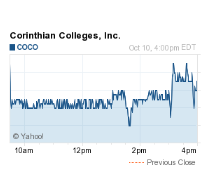State Sues California’s Largest For-Profit College Company for Fraud

One year ago, U.S. Senator Tom Harkin (D-Iowa) released a scathing report (pdf) on for-profit colleges that questioned their high drop-out rates, questionable programs and targeting of non-traditional students who piled up loads of debt.
When the report came out in June 2012, observers like Paul Fain at Inside HigherEd speculated that not much would come of it in the middle of an election year. He was right. But that was then and this is now.
On Thursday, California Attorney General Kamala Harris sued Corinthian Colleges, Inc., one of the 30 college companies profiled by Harkin, accusing it (pdf) of “predatory” activities that “targeted some of our state's most particularly vulnerable people—including low income, single mothers and veterans returning from combat.”
The Santa Ana-based company and its subsidiaries—Everest, Heald and WyoTech—have 24 campuses in California, 111 total campuses in the United States and Canada and three online programs. About one-third of its 81,000 students are in California. It is the largest for-profit college company in the state. Corinthian, founded in 1995, was a pioneer in for-profit colleges and has assets of more than $1 billion.
The schools allegedly used “deceptive and false advertisements and aggressive marketing campaigns that misrepresented job placement rates and school programs.” The same misrepresentations were also made to investors and accrediting agencies, the attorney general alleged.
Corinthian is also accused of illegally using military seals in advertising and sticking unlawful clauses in enrollment agreements that try to bar students from making any claims against it.
Corinthian told prospective students and investors that its placement rate for graduates averaged 68.1% and was as high as 100%. “Those placement rates are false,” the suit claims. “In some cases there is no evidence that a single student in a program obtained a job during the time frame specified in the disclosures.” Emails and other documents cited in the lawsuit show that senior executives knew the claims to be false.
For-profit companies like Corinthian target low-income students and veterans because they have access to state and federal education financial assistance. Federal money accounts for nearly half of Corinthian’s annual revenue. Internal company documents obtained by the attorney general describe its targeted demographic as “isolated,” “impatient,” individuals with “low self-esteem,” who have “few people in their lives who care about them” and who are “stuck” and “unable to see and plan well for future.”
A lot of the financial assistance is in the form of loans. Nationally, less than 10% of students at public and non-profit schools default on their obligations. For-profit college student defaults are more than double that, 22%. Corinthian student default rates in 2008 were 40% at 13 campuses and over 30% at 65 others.
The debts accumulated by Corinthian students would probably be even higher if they stayed in school. But they don’t. The dropout rate at Corinthian schools is appalling. The Harkin report found that 66.5% of students who enter an associate degree program, and 59.2% chasing a bachelor’s degree, don’t finish school.
For now the accreditation of Corinthian schools is not being challenged, but the attorney general warned students that such action could be taken down the road.
–Ken Broder
To Learn More:
Kamala Harris Sues for-Profit Parent of Heald College, WyoTech (by Jeremy B. White, Sacramento Bee)
California Sues for-Profit College Company, Saying It Sought out Poor and “Isolated” Students (by Katy Murphy, San Jose Mercury News)
Corinthian Colleges Challenged by Declining Enrollment (by Stuart Pfeifer, Los Angeles Times)
Results Are In (by Paul Fain, Inside HigherEd)
Corinthian Colleges (Report by Iowa Senator Tom Harkin) (pdf)
California v. Corinthian Colleges Inc. et al (San Francisco County Superior Court) (pdf)
- Top Stories
- Controversies
- Where is the Money Going?
- California and the Nation
- Appointments and Resignations
- Unusual News
- Latest News
- California Forbids U.S. Immigration Agents from Pretending to be Police
- California Lawmakers Urged to Strip “Self-Dealing” Tax Board of Its Duties
- Big Oil’s Grip on California
- Santa Cruz Police See Homeland Security Betrayal in Use of Gang Roundup as Cover for Immigration Raid
- Oil Companies Face Deadline to Stop Polluting California Groundwater





